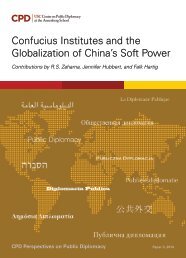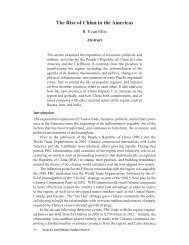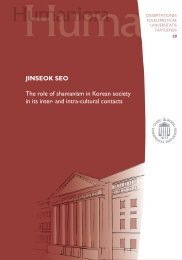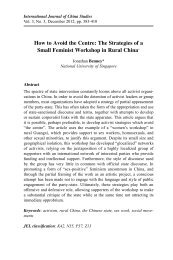JennyChan.PhDThesis.2014.FINAL
JennyChan.PhDThesis.2014.FINAL
JennyChan.PhDThesis.2014.FINAL
You also want an ePaper? Increase the reach of your titles
YUMPU automatically turns print PDFs into web optimized ePapers that Google loves.
suicide cluster represents a phenomenon that has no precedent in China’s industrial<br />
history, and perhaps in that of any other country. 5<br />
Foxconn hired western and Chinese psychologists and psychiatrists to defend it in<br />
the wake of the plague of worker suicides at the company. After “the 9 th Foxconn<br />
jumper” committed suicide on 11 May 2010 (seven had passed away since January),<br />
nine Chinese sociologists 6 formed an independent team to issue a public statement<br />
calling on Foxconn and the Chinese government to act decisively to end the tragic<br />
chain of suicides. It reads:<br />
From the moment they [the new generation of migrant workers] step<br />
beyond the doors of their houses, they never think of going back to<br />
farming like their parents. In this sense, they see no other option when<br />
they enter the city to work. The moment they see there is little<br />
possibility of building a home in the city through hard work, the very<br />
meaning of their work collapses. The path ahead is blocked, and the<br />
road to retreat is closed. Trapped in this situation, the new generation<br />
of migrant workers faces a serious identity crisis and this magnifies<br />
psychological and emotional problems. Digging into this deeper level<br />
of societal and structural conditions, we come closer to understanding<br />
the “no way back” mentality of these Foxconn employees. 7<br />
Unlike the first wave of internal migrant workers, who left the countryside to work<br />
in special economic zones in coastal China for several years before returning home,<br />
the younger and better-educated cohorts now massing in China’s cities appear to<br />
reject the regimented hardships their predecessors silently endured as cheap labor<br />
5 Pun Ngai, Shen Yuan, Guo Yuhua, Lu Huilin, Jenny Chan and Mark Selden, 2014,<br />
“Worker-Intellectual Unity: Trans-Border Sociological Intervention in Foxconn,” Current Sociology<br />
62(2), pp. 209-22; and, The Asia-Pacific Journal, 2014, Vol. 12, Issue 11, No. 3, March 17.<br />
http://japanfocus.org/-Shen-Yuan_/4093; Jenny Chan, 2013, “A Suicide Survivor: The Life of a<br />
Chinese Worker,” ew Technology, Worker and Employment 28(2), pp. 84-99; and, The Asia-Pacific<br />
Journal Vol. 11, Issue 31, No.1, August 12. http://www.japanfocus.org/-Jenny-Chan/3977; Jenny<br />
Chan and Pun Ngai, 2010, “Suicide as Protest for the New Generation of Chinese Migrant Workers:<br />
Foxconn, Global Capital, and the State,” The Asia-Pacific Journal 37-2-10, September 13.<br />
http://japanfocus.org/-Jenny-Chan/3408; Jenny Chan, 23 May 2010, “Dying Young,” Hong Kong:<br />
Students and Scholars Against Corporate Misbehavior. http://sacom.hk/archives/640<br />
6 The nine signatories of the open statement dated 18 May 2010 are: Shen Yuan (Tsinghua<br />
University), Guo Yuhua (Tsinghua University), Lu Huilin (Peking University), Pun Ngai (Hong Kong<br />
Polytechnic University), Dai Jianzhong (Beijing Academy of Social Sciences), Tan Shen (China<br />
Academy of Social Sciences), Shen Hong (China Academy of Social Sciences), Ren Yan (Sun Yat-sen<br />
University), and Zhang Dunfu (Shanghai University).<br />
7 Full text in Chinese: http://tech.sina.com.cn/it/2010-05-19/13214206671.shtml; English translation:<br />
http://sacom.hk/appeal-by-sociologists-address-to-the-problems-of-new-generations-of-chinese-migra<br />
nt-workers/<br />
2






